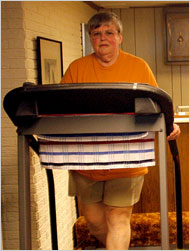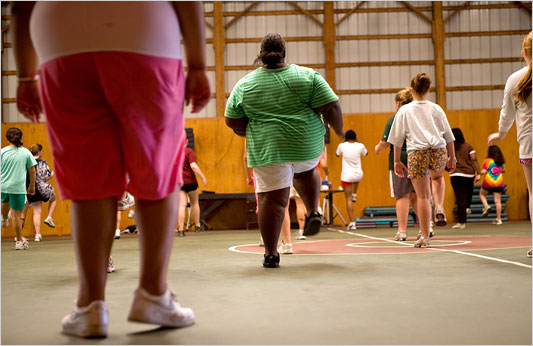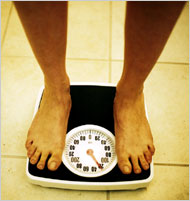One of the most common New Year’s resolutions is to lose weight or at least eat more healthfully. Several Web sites offer tips and tools for getting there.
Healthy Holidays
30 Days of Holiday Eating
 A series of daily tips, tidbits and insights about holiday food.
A series of daily tips, tidbits and insights about holiday food.
A Better Food Pyramid: Harvard nutritionists say their revamped food pyramid is based on the latest science and is “unaffected by businesses and organizations with a stake in its messages.” It starts with exercise and encourages adding more plant-based foods and cutting back on “American staples” like red meat, refined grains, potatoes and sugary drinks.
Dr. Gourmet: New Orleans physician Timothy S. Harlan, also known as Dr. Gourmet, has created free diet software that helps you plan more healthful meals. He calls it the Quality Calorie Diet Plan to reflect his belief that it’s the quality of the calories we eat that counts the most. The site creates meal plans and even offers ways to use leftovers later in the week. It includes food and exercise diaries as well as goal-tracking features, and a place for users to analyze their own recipes.
3FatChicks.com: This Web site began as a personal source of diet support for sisters Suzanne, Jennifer and Amy and has now grown into a community of over 70,000 registered members. It has the typical diet-site resources and tools, but the main appeal is the forum for dieters to share stories and find support.
Cooking Light: A great site for finding healthy and delicious foods that won’t make you feel like you’re on a diet. You’ll find recipes, nutrition information and advice on cooking techniques.
Food Blog Search: It’s not a diet site, but if you’ve resolved to cook at home more, this is a great resource for finding new recipes. This custom-built search engine uses Google technology to search for recipes in more than 2,600 food blogs.
National Body Challenge: Discovery Health’s National Body Challenge is a free fitness and weight loss program. After registering online, participants set their personal goals and create a customized eating and exercise plan. Registration gives users access to customized meal and fitness plans, a community of other Challenge participants, weight and fitness trackers and video and interactive tools as well as a 30-day free health club membership.
Weight Watchers — Although the site is offering a one-week free trial to it’s online plan, you’ll have to pay $65 for a three month subscription if you stick with it. While it’s true that most people who diet end up gaining back their weight, much of what Weight Watchers claims is backed by science. An April 2008 article in the British Journal of Nutrition looked at success rates of lifetime Weight Watchers members. They found that a year after reaching goal weight, 80 percent of participants had maintained at least 5 percent of the weight loss a year later and 27 percent of the dieters had stayed below their goal weight. While that means a lot of people regained their weight, it’s still more evidence for success than offered by most commercial diet plans.
South Beach Diet: This diet gained popularity as an alternative to the strict low-carb regimen of Atkins, with an emphasis on “good carbs” like high-fiber vegetables and whole grains. It also offers a free week trial, followed by a $5 a week membership fee.
So what have I missed? Are there other websites you’d recommend to help people lose weight and live healthier in 2009?
And for more on resolutions, read New Year, New You? Nice Try.


















 Healthy living doesn't happen at the doctor's office. The road to better health is paved with the small decisions we make every day. It's about the choices we make when we buy groceries, drive our cars and hang out with our kids. Join columnist Tara Parker-Pope as she sifts through medical research and expert opinions for practical advice to help readers take control of their health and live well every day. You can reach Ms. Parker-Pope at
Healthy living doesn't happen at the doctor's office. The road to better health is paved with the small decisions we make every day. It's about the choices we make when we buy groceries, drive our cars and hang out with our kids. Join columnist Tara Parker-Pope as she sifts through medical research and expert opinions for practical advice to help readers take control of their health and live well every day. You can reach Ms. Parker-Pope at 

